Alumni, ISEF, Science Talent Search
Society alumni honored as 2015 Davidson Fellows
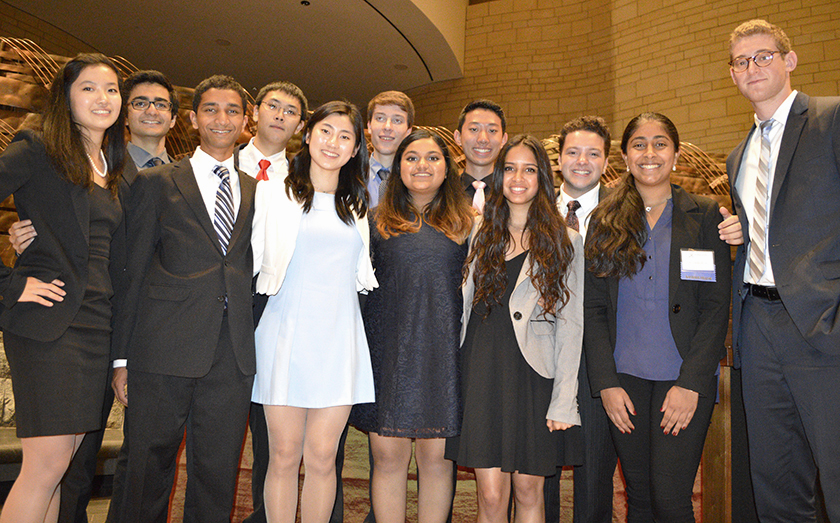
Twenty young scientists, mathematicians, creative writers, and musicians gathered in the rotunda of the National Museum of the American Indian in Washington, D.C. on September 29 for the fifteenth annual Davidson Fellows reception. The fellows received $10,000 to $50,000 scholarships from the Davidson Institute for Talent Development. Twelve of the recipients are Society for Science & the Public alumni. The three finalists who received $50,000 scholarships are all Society alumni.
Most of the fellows said their scholarship award would help them offset the costs of college. The 2015 fellows’ research focused on cancer and other diseases, the global water crisis, supercapacitor energy storage, and how literature can build connections among people.
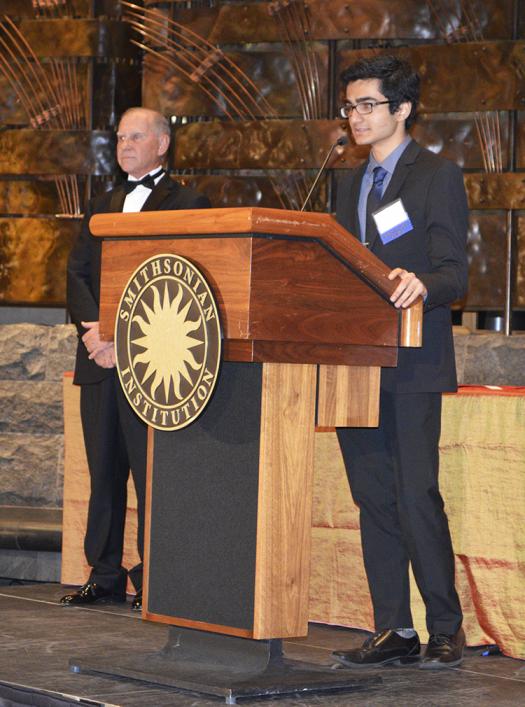
“It’s so cool to see in the high academic realms how receptive people are to young people with ideas,” said fellow Jazz Munitz during his speech. “We’re nothing more than young people who are trying to make a difference in our world.”
“I want to push the boundaries of what I know I can create,” said fellow Jenny Wang, who created a more effective way to produce 3D images of the brain.
Below are the 2015 Davidson Fellows who also participated in Society educational programs.
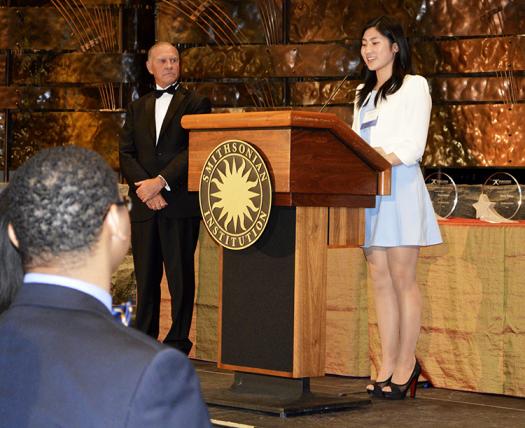
$50,000 Scholarship
- Noah Golowich was awarded a $50,000 scholarship for his research on a decade-old idea in the field of Ramsey theory, where certain patterns arise in large and complex systems. By assigning numbers a color, he proved and generalized a conjecture from 2005. This method has applications for developing algorithms for cryptography and scheduling. Noah attends Harvard University and plans to study mathematics or computer science. Noah was a 2015 Intel STS first place winner.
- Dhaivat Pandya was awarded a $50,000 scholarship for his research on encoding and decoding information as it travels through an Internet network. He studied ways to compress information as it flows through a network and the best algorithms for encoding and decoding. His methods can make the Internet faster and more scalable. Dhaivat attends Harvard University and studies computer science. He was a 2015 Intel STS finalist and a three-time Intel ISEF finalist.
- Swetha Shutthanandan was awarded a $50,000 scholarship for her research on supercapacitors, energy storage devices similar to batteries. These devices are used in hybrid electric vehicles, airplanes, smartphones, and computers. Swetha created next-generation supercapacitors by developing a new composite electrode. Her electrode showed an increase of 400 percent in the amount of energy it could hold compared to current commercial supercapacitors. Swetha was a 2014 Intel ISEF third place winner and individual finalist.
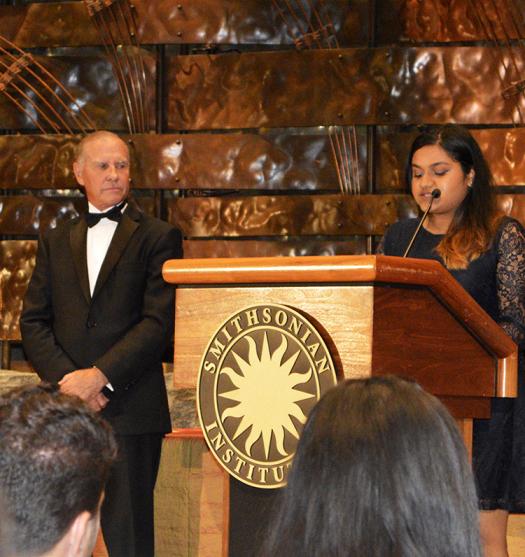
$25,000 Scholarship
- Joy Jin was awarded a $25,000 scholarship for her research on lung cancer metastasis and the drivers behind lung cancer recurrence. Lung cancer patients often experience recurrence within months after chemotherapy treatment and surgery, Joy said. Lung cancer is the most fatal cancer in the U.S. and has the lowest improvement rate over the past three decades, she said. Joy attends Harvard University and plans to study biology and health policy. She was a 2013 Intel ISEF third place winner.
- Saumya Keremane was awarded a $25,000 scholarship for her research on Citrus huanglongbing, a disease that has destroyed half of Florida’s citrus industry and is spreading to California. Saumya created tools, similar to pregnancy tests, to test for the presence of the disease with faster and more affordable methods. She attends the University of California, San Diego and studies biochemistry and cell biology. Saumya was a 2015 Intel STS semifinalist and a 2014 Intel ISEF second place winner.
- Peter Tian was awarded a $25,000 scholarship for his research on matrices. He advanced the theory of pattern avoidance — or finding out the maximum number of ones possible in a matrix — from two-dimensional matrices to multidimensional matrices. His results have potential applications to circuit design, robot motion planning, drone programming, and self-driving cars. Peter attends Harvard University. Peter was a 2015 Intel STS semifinalist.
- Sreya Vemuri was awarded a $25,000 scholarship for her research on optical fiber and the amplification and attenuation of light. She studied a current topic in quantum mechanics, PT symmetry from optical fibers. This can have applications in quantum computing and developing new lasers. Sreya was a 2015 Intel ISEF finalist.
- Moshe Willner was awarded a $25,000 scholarship for his research on building efficient optical communications, which forms the backbone of global communications. He will study abroad in Israel next year before attending the Columbia University’s School of Engineering and Applied Science to study biomedical engineering. Moshe was a 2014 Intel STS semifinalist.
- Phillip Yu was awarded a $25,000 scholarship for his research on in vitro drug delivery methods for Alzheimer’s and dementia. He studied the deficiency of the protein progranulin and identified a compound and inhibitor that increased levels of this protein. His ultimate goal is to send a drug into the world to help dementia patients, he said. He attends Harvard University. Phillip was a 2015 Intel STS semifinalist.
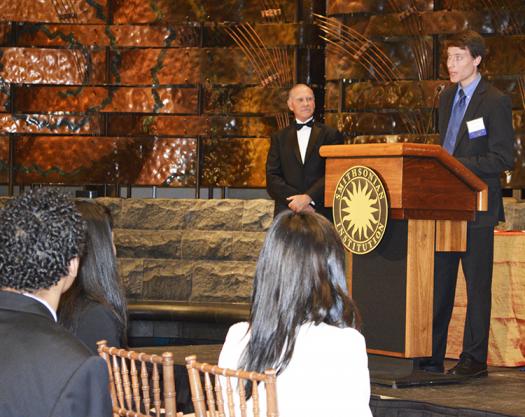
$10,000 Scholarship
- Augustine Chemparathy was awarded a $10,000 scholarship for his research on biodiesel from algae that offers a carbon-neutral alternative to fossil fuels. He achieved up to 30 percent higher oil yields than existing algae strains by simulating electron buildup conditions in unstressed algal cells. Augustine was a 2015 Intel STS finalist.
- Jazz Munitz was awarded a $10,000 scholarship for his research on offsetting the high cost of cancer drugs. Jazz created nanospheres designed to carry new molecules for cancer therapy directly to tumors. This technique requires lower dosages of drugs, which can reduce the side effects of chemotherapy. He studied how to bridge the gap between chemotherapy and the opposite approach of targeting specific cancers. He researched what he called “a Trojan horse nanoparticle” that would allow for the widespread treatment of multiple types of cancer at once. “Nanomedicine is going to be the thing which is going to change medicine for us and for future generations,” Jazz said. He attends Cornell University and plans to become a pediatric neurosurgeon. Jazz was a 2015 Intel STS semifinalist.
- Jenny Wang was awarded a $10,000 scholarship for her creation of a new computer vision algorithm, which allows more efficient analysis of the brain. This medical image segmentation technique can create high resolution 3D brain visualizations. This has the ability to help treat and diagnose neurodegenerative diseases, she said. Jenny attends Harvard University. She plans to make a career in technology innovation and creating opportunities for underprivileged children. Jenny was a 2015 Intel STS semifinalist.
The reception ended with fellow Joe Broom playing a rendition of “The Bullfight” on the tuba.


